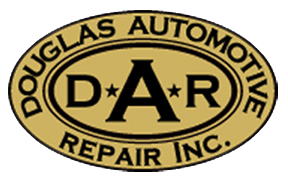
With temperatures soaring to record highs around the country over the next few days, Douglas Automotive Repair cautions motorists not to underestimate the ways in which extreme heat can wreak havoc on vehicles.
Prolonged exposure to high temperatures is not only a threat to passengers, but a vehicle concern as well. Knowing the dangers and preparing your vehicle for extreme heat can help keep your vehicle running smoothly during the hot summer months.
To keep your vehicle running smoothly not only this summer, but over the next few hot days, we recommend motorists address the following common heat-related car problems:
Over-Heating Engine
Automobile engines work extra hard in the summer, and it is the cooling system’s job to protect the engine from overheating. In addition, additives in the coolant protect the radiator and internal engine components against wear and corrosion. Without proper cooling system maintenance, the odds of long term engine damage, and a summer time boil over, definitely increase.
Over time, engine coolant becomes contaminated and its protective additives are depleted. That’s why the system should be flushed and the coolant replaced periodically as recommended by the vehicle manufacturer. Older coolants required changing every two years or 24,000 miles, but most modern formulations are good for at least five years and 50,000 miles, and many do not require replacement until approximately 100,000 miles. See the owner’s manual or maintenance booklet to determine the service interval appropriate for a vehicle.
Between flushes, make sure the coolant is filled to the proper levels by checking the overflow reservoir. If necessary, top off the reservoir with a 50/50 mix of water and the coolant type specified by the vehicle manufacturer. CAUTION! – Never remove the radiator cap when the engine is hot – boiling coolant under pressure could cause serious burns.
Other fluids help keep vehicles running cool as well. Most vehicle fluids don’t just lubricate, they also serve as coolants by helping carry heat away from critical components. When fluid levels are low, this cooling effect is reduced, and the possibility of overheating increases. Drivers should check all vehicle fluids including motor oil, transmission fluid, power steering fluid and brake fluid to ensure they are filled to the appropriate levels. If any fluids need to be topped off, be sure to use the type of fluid specified in the owner’s manual.
Battery Failure Due to Heat and Vibration
Heat and vibration are a battery’s two worst enemies, leading to internal breakdown and eventual failure. While drivers cannot do much about the heat, they can make sure their battery is securely mounted in place to minimize vibration.
If a car’s battery is more than three years old, it’s a good idea to have it tested by a trained technician to determine how much longer it will last. Should the battery need replacement, we can usually replace it immediately.
Blown Tire
Driving on under-inflated tires not only affects the handling and braking of a vehicle, it also can cause tires to overheat and increase the likelihood of a blowout. This problem becomes even more of a concern when road temperatures are extremely high.
Tires should be checked when the car has not been driven recently, and they should be inflated to the pressure recommended by the vehicle manufacturer—not the number molded into the tire sidewall. Recommended tire pressures can be found in the owner’s manual or on a tire information sticker normally located on the driver’s door jamb. Drivers also should inspect the tire treads for adequate depth and any signs of uneven wear that might indicate a suspension or alignment problem.
Air Conditioning Failure
During extreme summer heat, a properly operating air conditioning system can be more than just a pleasant convenience. If a car’s air conditioning is not maintaining the interior temperature as well as it did in the past, it may mean the refrigerant level is low or there is another problem. Have the air conditioning system checked by a certified technician.
Many automotive climate control systems today are equipped with a cabin filter that prevents outside debris from entering. If present, this filter should be inspected and replaced as needed to ensure maximum airflow and cooling during the summer months.
If you think your vehicle is experiencing problems due to the extreme summer heat, Give Douglas Automotive Repair a call today!
(Information obtained from AAA website.)
This entry was posted in Safety, Summer and tagged Heat Danger, Safety, Summer on .
